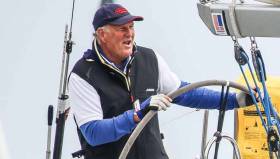Displaying items by tag: Clare Morgan
Four Time Olympian Mark Mansfield Joins UK Sailmakers Ireland
The new owners of Cork Harbour based UK Sailmakers Ireland have appointed Mark Mansfield as an agent and racing consultant to their Crosshaven loft.
Mansfield is a Royal Cork Yacht Club stalwart at the top end of sailing for many years — this season serving as tactician on a number of leading Irish keelboat campaigns, including a third consecutive win at the ICRA National Championships on the J109 Joker 2 that also won Boat of the Week at Dun Laoghaire Regatta.
Recently retired from his career in banking, Mansfield has been looking for a new business direction that puts his passion for sailing first.
And he feels that representing the quality product line of UK Sailmakers Ireland is a perfect fit.
“They have always had a strong reputation in Ireland and worldwide for many years and offer a very viable alternative — and with the new owners, will be priced very competitively,” Mansfield says.
He emphasises the quality product and backup, competitive prices and expertise in sail and rig set-ups that will make UK Sailmakers Ireland a new force in sail packages — and the number-one choice for your boat.
When it comes to his own credentials, Mansfield’s renown in the speed arena is in no doubt. A four-time Olympian (in Barcelona, Atlanta, Sydney and Athens) in the Star keelboat, Mansfield also notched a win in the Star Euros and a third place in the Star Worlds. He has also won National and Euro honours in Royal Cork's own 1720 sportsboat class.
In 2005 he returned to big boats, which he had previously helmed in the 1980s to a series of Admiral’s Cups, when he took the helm of the unforgettable Jump Juice in the Commodore’s Cup.
Switching to Sailing Class One in more recent years, Mansfield had found his calling as a title-winning tactician on boats such as Joker 2, Big Picture (Half Tonner) and Anchor Challenge (Quarter Tonner), as well as being a middleman in the Etchells and Dragon class.
He's also produced results offshore winning in class in the 2016 Round Ireland Race.
In these roles, Mansfield has built a solid reputation for his expertise in fast sail shapes and rig tuning. A move into sailmaking is therefore a natural progression — and a shrewd investment for UK Sailmakers Ireland continued growth.
Mansfield will be lending his strategic talents to the marketing of UK Sailmakers’ Titanium package, which has already proven popular internationally. Expect to see more of these on the Irish sailing scene in the coming years, especially with Mansfield involved.
UK Sailmakers Ireland was founded as McWilliam Sailmakers in Crosshaven in 1974 by noted dinghy and offshore racing champion John McWilliam and his wife Diana. Four years later they were joined by John’s brother Des and his wife Sue, who took over the business in 1993.
In 1996 McWilliam Sailmakers joined the Ulmer Kolius group’s network of UK Sailmakers lofts, rebranding as UK/McWilliam. In 2011 Des McWilliam was elected president of UK Sailmakers, succeeding the group’s founder Butch Ulmer.
This past summer Des McWilliam and his wife Sue announced their retirement at the end of this year, as well as the sale of their business to Barry Hayes, who started his sailmaking career with the McWilliam family; Hayes’ wife Claire Morgan; and Graham Curran, who currently works in the Crosshaven loft.
UK Sailmakers Ireland contacts:
Mark Mansfield ([email protected])
Claire Morgan ([email protected])
Graham Curran ([email protected])
Barry Hayes ([email protected])





























































